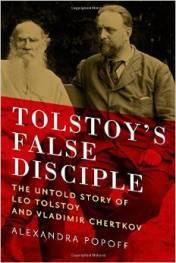The Great Man in Eclipse
Far from an innocent admirer and promoter of Tolstoy’s teachings, the Chertkov that emerges in Ms. Popoff’s book is a manipulative and unscrupulous figure intent on gaining complete control over the man he claimed to be serving. Through flattery, guile and force of will, Chertkov made himself the sole representative of Tolstoy’s works outside Russia, and he managed to obtain a monopoly on Tolstoy’s latest and most profitable writings. Chertkov also wrung from Tolstoy the sole right to copy his diaries and his entire correspondence. And he did not stop there. From around 1890, Chertkov began to edit Tolstoy’s works and even to tell him what to write. He hired secretaries for his patron and then forced them to act as his spies, insisting that he be informed of everything Tolstoy did and said and everyone he met with. Toward the end of the writer’s life, Chertkov decided who would be permitted access to Tolstoy.
Chertkov’s baleful influence has been noted by others before, but Ms. Popoff’s book is the most damning indictment to date. Chertkov intruded into the most intimate affairs of the Tolstoy family; nothing, he felt, should be outside his purview. “If Chertkov loved Tolstoy, his love was selfish, obsessive and pathological,” Ms. Popoff writes. After exerting unrelenting pressure on Tolstoy, Chertkov even persuaded him to sign a secret will that made Chertkov the lone executor of Tolstoy’s literary estate. The target of this secrecy was Sophia, the only person capable of stopping Chertkov. She saw through his machinations, and her inability to open her husband’s eyes to them nearly drove her mad. In one of his wickedest tricks, Chertkov forced her to submit to a psychiatric examination that found her to be suffering from paranoia and hysteria. Chertkov made certain to publicize the doctor’s findings.
What makes the story so painful is the extent to which Tolstoy cooperated. The man who had stood up to the despotism of Russian autocracy and the dogmatism of the Orthodox Church was incapable of resisting the petty despotism of his disciple—in fact, he encouraged it, filling his letters to Chertkov with nasty and unfair criticisms of his wife and children. Having denounced Sophia as cruel for wanting a wet nurse (she bore him 13 children), Tolstoy condoned Chertkov’s wife for using one and actually went out of his way to help her find one. While complaining to Chertkov that his wife’s materialism made him a prisoner, Tolstoy never once made mention of Chertkov’s owning three estates and his love of expensive things.
Just why a man like Tolstoy felt so completely under Chertkov’s spell remains something of a mystery. Were they, perhaps, lovers? As Ms. Popoff notes, their “love-friendship correspondence . . . suggests their relationship was homoerotic,” and Sophia was convinced that their relationship was physical. Without ruling this out, the author finds the most logical answer in the deficiencies of Tolstoy’s character. He admitted once to Sophia that there was “a weak man in me” who loved the flattery and attention that Chertkov showered upon him, even if he knew it to be less than honest. “Perhaps, it’s because you praise me so much,” Tolstoy wrote to Chertkov in 1910, speculating about why he had wept over Chertkov’s recent letter, “but I hope it’s because I love you so much.”
Douglas Smith

